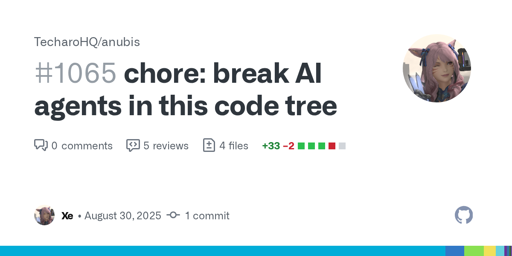Ananace
Just another Swedish programming sysadmin person.
Coffee is always the answer.
And beware my spaghet.
- 40 Posts
- 126 Comments

 9·3 months ago
9·3 months agoI absolutely love that zip-tie mounting solution, it’s the kind of thing I wish I saw in more homelab setups.

 101·4 months ago
101·4 months agoI really do hope that Funkwhale get their 2.0 release out soon, should make self-hosted Spotify-like stacks simpler to do, and the fact that it works for creation and distribution as well is great.

 8·5 months ago
8·5 months agoNo longer an assumption - from itch themselves: https://itch.io/updates/update-on-nsfw-content

 931·5 months ago
931·5 months agoAssuming that this is due to pressure from VISA/MasterCard - like it’s been with Steam.
It’s patently bizarre how a company whose only purpose is transferring money from account A to B can then arbitrarily decide what people are allowed to buy and sell.
It’s one thing to refuse to be an acceptable payment method for NSFW games, but to forbid the store from selling them at all? That’s just megalomania, and a great pointer to why monopolies (and duopolies) are A Bad Thing™

 1·8 months ago
1·8 months agoInteresting, that’s definitely not what I’m seeing from regular use. Are you running any added applications? LDAP? SSO? External mounts?

 1·8 months ago
1·8 months agoAre you looking at data rates or IO operations? Because this is almost exclusively stat queries, i.e. inode queries.

 1·8 months ago
1·8 months agoOh yeah, CPU usage is basically zero, and memory usage of the PHP code itself is also basically nil compared to other software I run. It’s just the sudden storms of IO requests that causes issues, and since those come over a network pipe it causes issues for other pieces of software as well.

 5·8 months ago
5·8 months agoAgain, it works until it requires reloading, i.e. the next update of any component or the next restart of the server.
I’m also running an inode cache on the client side, on top of the persistent opcache, but due to the sheer number of files that Nextcloud consists of it still generates a frankly ridiculous amount of calls when it needs to invalidate the cache. If you’re running on local drives then that’s likely much less of an issue, regardless of what kind of drive it is, but this is hosted on machines that do not have any local storage.

 3·8 months ago
3·8 months agoYep, those values are actually somewhat tame compared to my own cache tuning, the issue remains that the code requires reloading PHP files from disk during runtime in order to support applications and updates, which - even if it doesn’t happen often - causes IO storms that temporarily break both Nextcloud as well as other software.

 22·8 months ago
22·8 months agoCurrently working to move away from Nextcloud myself, it’s PHP nature causes IO storms when it tries to check if it needs to reload any code for incoming requests.

 6·8 months ago
6·8 months agoAll OpenWRT-based routers have the option of built-in DNS-based adblock, can thoroughly recommend the Turris routers for such things.

 181·9 months ago
181·9 months agoThey actually did a study on it after rolling back to Windows, and it turned out to not have failed due to technical difficulties at all.
If I recall correctly they stated that something like 80-90% of all issues reported during the period were due to badly designed processes - processes which were the same as in Windows, and the number of technical issues actually dropped.Certainly, the fact that Microsoft promised to build a fancy new HQ in the city if they switched back to Windows can’t have had anything to do with the choice to roll back…

 3·9 months ago
3·9 months agoDefault block for incoming traffic is always a good starting point.
I’m personally using crowdsec to good results, but still need to add some more to it as I keep seeing failed attacks that should be blocked much quicker.

 111·10 months ago
111·10 months agoHonestly, the two reasons I’ve been sticking with Plex is the federated/shared libraries and watch together.
If they’re starting to axe those then I see no reason to continue using it.

 2·11 months ago
2·11 months agoDone both, but I’ve found I rather enjoy the mix of stick and trackpad, emulated as KB+M

 13·11 months ago
13·11 months agoI might be slightly biased, but I can also recommend OpenMW for Deck.

 2·1 year ago
2·1 year agoWell, there’s the ALFIS project
Remember to join the !advent_of_code@programming.dev community while you’re at it
MS Outlook is the joke.





















Considering this is anubis, the project created explicitly to block AI crawlers?